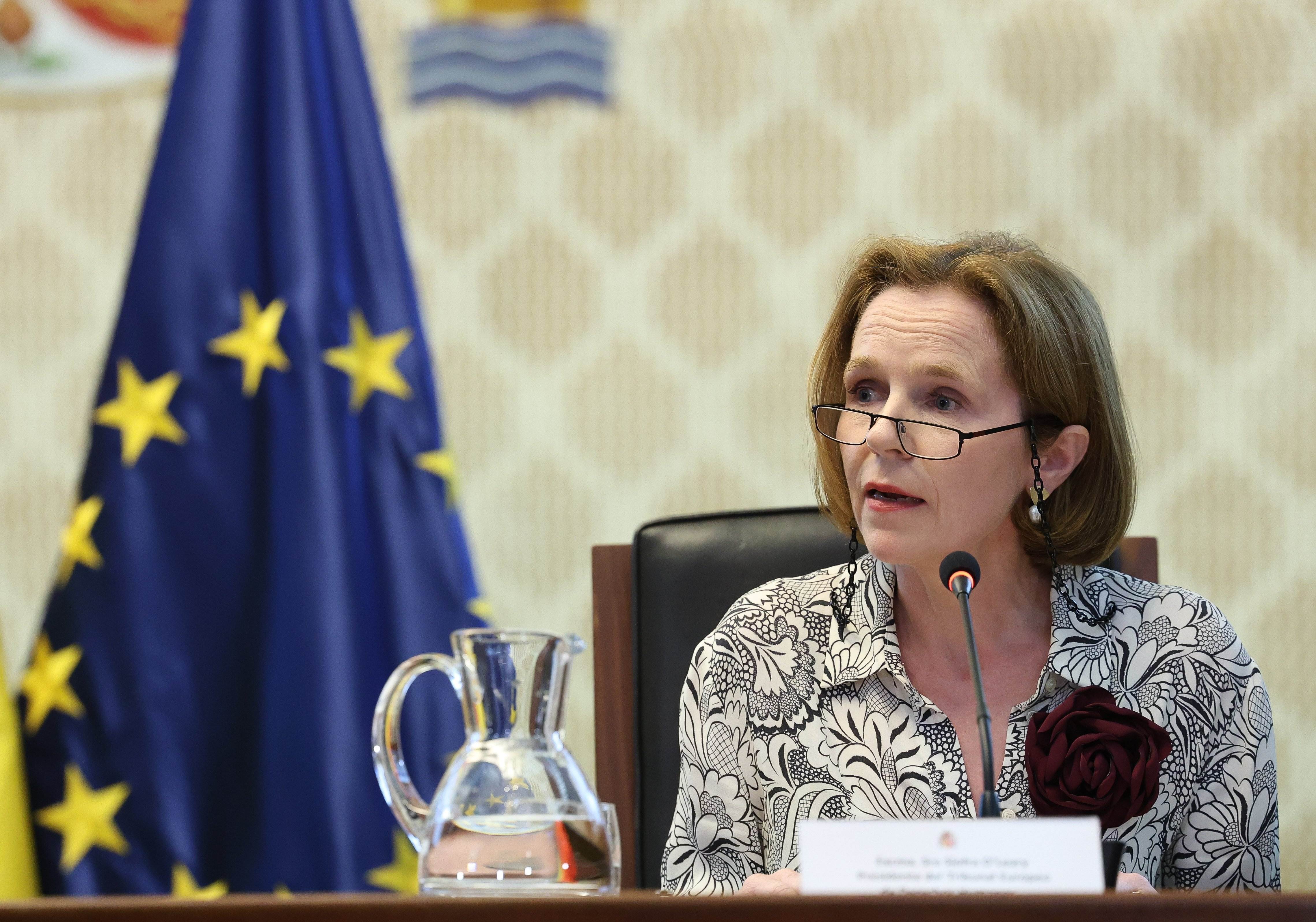It's a particularly delicate moment. The president of the European Court of Human Rights (ECHR), Síofra O'Leary, has made an official appearance in Madrid, at a time when not only has the court just agreed to consider the appeals made by the nine Catalan pro-independence leaders convicted of sedition by the Supreme Court, but also, when Spanish politics is dominated by the ongoing negotiations between the Spanish Socialists (PSOE) and Together for Catalonia (Junts), with the issue of an amnesty for independence process prosecutions as a core element of talks. In parallel with the ECHR's analysis of the Catalan leaders' appeals, the possible approval of an amnesty law has unleashed a heated legal debate and it is known that, if the law is passed, it will end up on the table of the Spanish Constitutional Court, which today welcomed the visit of the Irish jurist. Thus, two legal avenues converged for a few hours in the Spanish capital.
In her judicial speech, delivered in perfect Spanish, the president of the human rights court avoided all reference to the appeals that the Strasbourg institution has on the table relating to the independence process. "I will not take a position on pending cases or possible future cases", said O'Leary in an auditorium full of Constitutional and Supreme Court judges. In conversation with her interlocutors, the jurist did admit that this issue is "important" for the ECHR's Grand Chamber, although they are not willing to put a date on it. This case is a hot potato and, in fact, the judge emeritus of the Spanish Supreme Court, José Antonio Martín Pallín, affirmed in an interview with ElNacional.cat that it was "significant" that the ECHR had accepted the appeals of the pro-independence leaders, given that the usual procedure, he affirmed, "is to reject the demands".
While waiting for the ECHR to rule on the appeals of the independence process prisoners, the president of the Constitutional Court, Cándido Conde-Pumpido, expressed his pride in representing Spain, "one of the countries that receives the fewest condemnatory sentences" from the human rights court. And when it receives them, he said, the Spanish state does not consider them a "condemnation", but "a path, an advance and a progress". According to data from the court in charge of applying the European Convention on Human Rights, Spain received a total of 143 judgments finding it had committed human rights violations between 1959 and 2022, far from the 3,317 of Russia.
Among the cases she mentioned, the Irish jurist referred to the ruling that overturned the so-called Parot Doctrine, which ruled that 'good behaviour' sentence reductions - in this case, affecting convicted members of the Basque terrorist group ETA - had to be applied with respect to the maximum legal imprisonment of 30 years, and not, as previously, on their total sentences when they were sometimes much longer. In this regard, O'Leary recalled that the plaintiff - ETA member Inés del Río - who won the case, was released the day after the sentence. "The social and political division did not interfere with the strict compliance with the obligations of the state", she affirmed.
The uncomfortable issue of the amnesty
In the subsequent refreshments session, the possible amnesty also made its presence felt as an uncomfortable element among the Constitutional Court judges. Legal sources admit that, with no text for the proposed law on the table, the judges of Spain's court of statutory guarantees are avoiding making any type of reference to it in order not to get into any trouble. In fact, the judges say that they feel annoyed because they are at the centre of the public debate, when the regulatory process has not even started, and they are uncomfortable that it is interpreted that the court's current progressive majority will endorse the hypothetical text.
With Spain's highest organ of judicial power, the General Council of the Judiciary, having been deadlocked for the last five years, unable to renew its membership, and in front of an auditorium with the presence of judges from that body, O'Leary stressed, without going into details, that "when deadlocks occur on a political scale", in relation to the appointment of judges, "national and European courts can intervene in defence of both judicial independence and the proper functioning of a democratic state governed by the rule of law". Apart from this, O'Leary also provided some interesting data relating to Russia's war in Ukraine. As of last September, the ECHR had accumulated 75,600 legal demands pending resolution, of which 15,000 are individual cases against the Russian state.

